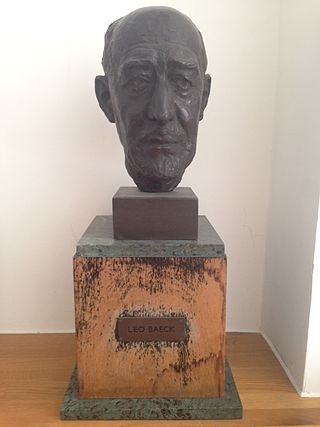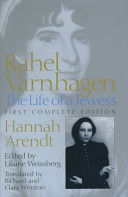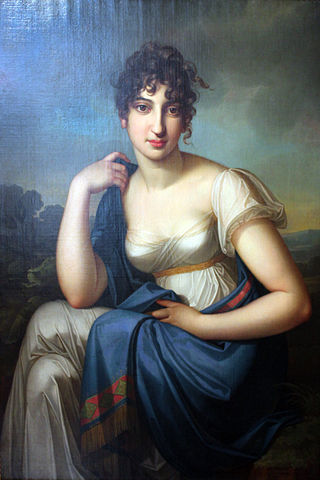
Leopold Zunz was the founder of academic Judaic Studies, the critical investigation of Jewish literature, hymnology and ritual. Zunz's historical investigations and contemporary writings had an important influence on contemporary Judaism.

Hannah Arendt was a German-American historian and philosopher. She was one of the most influential political theorists of the 20th century.

Karl August Varnhagen von Ense was a German biographer, diplomat and soldier.

Leo Baeck was a 20th-century German rabbi, scholar, and theologian. He served as leader of Reform Judaism in his native country and internationally, and later represented all German Jews during the Nazi era. After the Second World War, he settled in London, in the United Kingdom, where he served as the chairman of the World Union for Progressive Judaism. In 1955, the Leo Baeck Institute for the study of the history and culture of German-speaking Jewry was established, and Baeck was its first international president. The Leo Baeck Medal has been awarded since 1978 to those who have helped preserve the spirit of German-speaking Jewry in culture, academia, politics, and philanthropy.

The history of the Jews in Germany goes back at least to the year 321 CE, and continued through the Early Middle Ages and High Middle Ages when Jewish immigrants founded the Ashkenazi Jewish community. The community survived under Charlemagne, but suffered during the Crusades. Accusations of well poisoning during the Black Death (1346–53) led to mass slaughter of German Jews, while others fled in large numbers to Poland. The Jewish communities of the cities of Mainz, Speyer and Worms became the center of Jewish life during medieval times. "This was a golden age as area bishops protected the Jews, resulting in increased trade and prosperity."

Rahel Antonie Friederike Varnhagen was a German writer who hosted one of the most prominent salons in Europe during the late-18th and early-19th centuries. She is the subject of a celebrated biography, Rahel Varnhagen: The Life of a Jewess (1957), by Hannah Arendt. Arendt cherished Varnhagen as her "closest friend, though she ha[d] been dead for some hundred years". The asteroid 100029 Varnhagen is named in her honour.
"Wissenschaft des Judentums" refers to a nineteenth-century movement premised on the critical investigation of Jewish literature and culture, including rabbinic literature, to analyze the origins of Jewish traditions.

Paula Hyman was an American social historian who served as the Lucy Moses Professor of Modern Jewish History at Yale University.
Jewish assimilation refers either to the gradual cultural assimilation and social integration of Jews in their surrounding culture or to an ideological program in the age of emancipation promoting conformity as a potential solution to historic Jewish marginalization.

Moritz Güdemann was an Austrian rabbi and historian. He served as chief rabbi of Vienna.
Jüdischer Kulturbund, or Der Jüdische Kulturbund, was a cultural federation of German Jews established in 1933. It hired over 1,300 men and 700 women artists, musicians, and actors fired from German institutions. According to Jonathan C. Friedman, it grew to approximately 70,000 members, while Saul Friedländer tallies its roster as high as 180,000.

The Leo Baeck Institute, established in 1955, is an international research institute with centres in New York City, London, Jerusalem and Berlin, that are devoted to the study of the history and culture of German-speaking Jewry. The institute was founded in 1955 by a consortium of influential Jewish scholars including Hannah Arendt, Martin Buber and Gershom Scholem. The Leo Baeck Medal has been awarded since 1978 to those who have helped preserve the spirit of German-speaking Jewry in culture, academia, politics, and philanthropy.
Wir Juden is a 1934 book by German rabbi Joachim Prinz that concerns Hitler's rise to power as a demonstration of the defeat of liberalism and assimilation as a solution for the "Jewish Question", and advocated a Zionist alternative to save German Jews. The book urged German Jews to escape National Socialist persecution by emigrating to Palestine. Prinz himself was expelled in 1937, travelling to the US where he became a leader of the American Jewish community and the Civil Rights Movement.
Saul Ascher was a German writer, translator and bookseller.
The Leo Baeck Institute London is a research institute dedicated to the study of German-Jewish history, politics and culture, founded in 1955. It belongs to the international Leo Baeck Institute with further research centres in New York City, Berlin and Jerusalem.
Sara Grotthuis, born Sara Meyer, also known as Sophie Leopoldine Wilhelmine Baroness von Grotthuis and as Sara Wulff by her first marriage, was one of the most well-known "salonnières" of the late 18th and early 19th centuries in Berlin.

Rahel Varnhagen: The Life of a Jewess is a biography of Rahel Varnhagen written by political philosopher Hannah Arendt. Originally her Habilitationsschrift she completed it in exile as a refugee, but was not published till 1957, in English, in the UK (London) by East and West Library.

Amalie Malka Beer was a German Jewish philanthropist, communal worker, and salonnière.

Rebecca Friedländer was a German novelist and short-story writer, composed “romantic novels” under the pen name of Regina Frohberg. She was also a close friend of Rahel Varnhagen, a renowned German writer.
Liliane Weissberg is an American literary scholar and cultural historian specializing in German-Jewish studies and German and American literature. She is currently the Christopher H. Browne Distinguished Professor in Arts and Sciences and Professor of German and Comparative Literature at the University of Pennsylvania. She received, among others, a Guggenheim Fellowship, the Humboldt Research Award for her research on German-Jewish literature and culture and the Berlin Prize of the American Academy in Berlin, and holds an honorary degree from the University of Graz.












